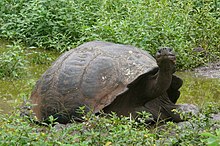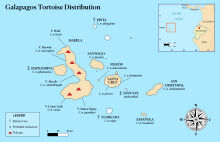加拉巴哥象龜
| 加拉巴哥象龜 | |
|---|---|

| |
| 棲息於聖克魯斯島上的加拉巴哥象龜。 | |
| 科學分類 | |
| 界: | 動物界 Animalia |
| 門: | 脊索動物門 Chordata |
| 綱: | 爬蟲綱 Reptilia |
| 目: | 龜鱉目 Testudines |
| 亞目: | 曲頸龜亞目 Cryptodira |
| 科: | 陸龜科 Testudinidae |
| 屬: | 南美象龜屬 Chelonoidis |
| 種: | 加拉巴哥象龜 C. nigra
|
| 二名法 | |
| Chelonoidis nigra | |
| 亞種 | |
| |

| |
| 異名[15] | |
|
亞種異名[7]
亞種異名 (概要)[12] C. n. nigra (指名亞種)
C. n. abingdoni
C. n. becki
C. n. chathamensis
C. n. darwini
C. n. duncanensis
C. n. hoodensis
C. n. phantastica
C. n. porteri
C. n. vicina 亞種異名 (全部)[15]
| |
加拉巴哥象龜(學名:Chelonoidis nigra)是現存體型最大的陸龜之一。為厄瓜多加拉巴哥群島特有。成年象龜身長1.5 公尺(4.9英尺),平均體重達到175公斤,最高紀錄為400公斤(880磅),在爬蟲類中列第13位。野外壽命超過100年。2006年6月23日在澳洲動物園因心臟衰竭病逝的大象龜哈麗,估計享年約175歲,病逝前為世上最長壽的存活動物。
由於加拉巴哥群島中不同島上的生態環境有明顯的差異,故不同亞種的象龜形態都不同。在濕潤的高地島,象龜更大,有半球形的殼和短脖子,在乾燥的低地島,象龜更小,有馬鞍形的殼和長脖子。這啟發出達爾文對「演化論」的思考。
近年這些群島上各品種之間的關係存在爭議,故現時將加拉巴哥象龜歸類為一個物種綜合(species complex),而非單一物種。
16世紀加拉巴哥象龜的數量大約有25萬隻,1970年代只剩下3000隻,主要原因是人的捕獵以獲取肉和油,棲息地被農業生產占用和物種入侵,如羊和豬。原有的15個亞種還剩十個亞種在野外生存,第十一個亞種只剩一隻名為「孤獨喬治」的雄龜,於2012年6月死亡。20世紀初開始的動物保護活動使象龜現有的數量回復到1.9萬隻。在國際自然保護聯盟名錄中屬於易危物種。
分佈與棲息地
[編輯]
加拉巴哥象龜只分佈於南美洲加拉巴哥群島的9個小島上。為適應各島上不同的環境以及食物來源,象龜在數百萬年間分化成15個亞種,現在僅約10種還有野外存活的個體,最近絕種的品種平塔島象龜(C. n. abingdoni)曾長期只剩一隻名為「孤獨喬治」的雄龜。加拉巴戈斯國家公園(Galapagos National ParkService)於2012年6月24日發出聲明,「孤獨喬治」已經死亡。在6月24號當日,長久以來一直照顧「孤獨喬治」的勒裏納(Fausto Llerena)發現牠的屍體癱在地上,面朝聖克魯斯島(Santa Cruz Island)上「牠水坑的所在方向」。[16]
品種列表
[編輯]| 品種 [17][18] | 保育狀況 |
|---|---|
| C. abingdonii 平塔島象龜 |
|
| C. becki (named for Rollo Beck) 沃爾夫火山象龜(來自伊莎貝拉島) |
 |
| C. chathamensis 聖克里斯托巴爾島象龜 |
 |
| C. darwini (以查爾斯·達爾文命名) 聖地亞哥島象龜 |
 |
| C. duncanensis 平松島象龜 |
 |
| C. donfaustoi 加拉巴哥·唐福斯托象龜(分佈在聖克魯斯島東部) |
未知,現存約250隻;於2015年獲確認為新種 |
| C. guentheri (以阿爾伯特·甘瑟命名) 內格拉火山象龜(來自伊莎貝拉島) |
 |
| C. hoodensis 艾斯潘諾拉島(西班牙島)象龜 |
 |
| C. microphyes (L. 'small in stature') 達爾文火山象龜(來自伊莎貝拉島) |
 |
| C. nigra (L. 'black') 弗雷里安納島象龜 |
1846年被宣布絕種 |
| C. phantasticus 費爾南迪納巨龜(分佈在費爾南迪納島) |
 極危;於2019年重新被發現 |
| C. porteri 聖克魯斯島象龜 |
 |
| C. vandenburghi
阿爾塞多火山象龜(來自伊莎貝拉島)
|
 |
| C. vicina (L. 'near') 阿蘇爾火山象龜(來自伊莎貝拉島)
|
 |
習性
[編輯]龜是變溫動物,因此在陽光下曬1-2小時,吸收太陽的熱量,而天亮後他們會透過爬樹積極覓食。牠們每天睡8-9小時,大多在清晨或傍晚休息。同時,牠們的行走速度為每小時0.3公里(0.2英里)。
在較大、較潮濕及低海拔的島嶼上,龜之間會出現季節性遷移,在乾燥的季節,牠們會遷移到海拔較高(610公尺)的草原地區。同一路線已出現了很長時間,創造良好行走的路徑,而被烏龜通過的灌木叢被稱為「烏龜公路」。
在涼爽的夜晚,加拉巴哥象龜會會在泥濘的及雨水形成的池中休息,這可能是由於需要進行體溫調節和驅趕寄生蟲。亦有些龜會在伸出的岩石下休息。
飲食
[編輯]加拉巴哥象龜是草食動物,食物包括仙人掌、草、樹葉、苔蘚和漿果等。一隻烏龜平均每天吃32-36公斤(70-80磅)的食物,但因消化系統的效率較低,因此攝取的營養也較少。
陸龜以植物的露水和汁液獲得大部分水份,因此,他們可以在很長時間內不喝水。他們也可以忍受長達18個月的時間不進食不喝水;而口渴時,他們喝水的速度可以既大量又快速,並儲在自己的膀胱及心臟,使他們在長時間內不用再喝水。在乾旱的島嶼上,象龜會在清晨時舔舐巨石上的露水,許多岩石上已形成因連續多代的此類行為所造成的岩石凹陷。
瀕危原因
[編輯]在達爾文初到加拉巴哥群島時,加拉巴哥象龜的數量大約有25萬隻,現在卻只剩下1萬9千隻。數量劇降的最主要原因是18至19世紀的捕鯨者及海盜經常捕捉象龜作為在船上的糧食。
保護狀況
[編輯]加拉巴哥群島現已受到厄瓜多政府保護,列為國家公園,也是世界自然遺產。
參見
[編輯]參考資料
[編輯]- ^ 1.0 1.1 1.2 1.3 Quoy, J.R.C.; Gaimard, J.P. Sous-genre tortue de terre – testudo. brongn. tortue noire – testudo nigra. N.. de Freycinet, M.L. (編). Voyage autour du Monde ... exécuté sur les corvettes de L. M. "L'Uranie" et "La Physicienne," pendant les années 1817, 1818, 1819 et 1820. Paris. 1824b: 174–175 (法語).
- ^ 2.0 2.1 Günther 1877,第85頁
- ^ 3.0 3.1 3.2 3.3 3.4 3.5 3.6 3.7 Van Denburgh, John. Preliminary descriptions of four new races of gigantic land tortoises from the Galapagos Islands. Proceedings of the California Academy of Sciences, Series 4. 1907, 1: 1–6 [2012-01-12]. (原始內容存檔於2012-05-23).
- ^ 4.0 4.1 4.2 4.3 4.4 Garman, Samuel. The Galapagos tortoises. Memoirs of the Museum of Comparative Zoology at Harvard College. 1917, 30 (4): 261–296.
- ^ 5.0 5.1 Rothschild, Walter. Description of a new species of gigantic land tortoise from Indefatigable Island. Novitates Zoologicae. 1903, 10: 119 [2012-01-11]. (原始內容存檔於2012-10-01).
- ^ 6.0 6.1 6.2 6.3 6.4 Günther, Albert. Description of the living and extinct races of gigantic land-tortoises. parts I. and II. introduction, and the tortoises of the Galapagos Islands. Philosophical Transactions of the Royal Society of London, Biological Sciences. 1875, 165: 251–284. Bibcode:1875RSPT..165..251G. JSTOR 109147. doi:10.1098/rstl.1875.0007.
- ^ 7.0 7.1 Pritchard 1996,第49頁
- ^ Gray, John Edward. Description of a new species of tortoise (Testudo planiceps), from the Galapagos Islands. Proceedings of the Zoological Society of London. 1853, 21 (1): 12–13 [2012-01-11]. doi:10.1111/j.1469-7998.1853.tb07165.x. (原始內容存檔於2012-05-23).
- ^ Williams, Ernest E.; Anthony, Harold Elmer; Goodwin, George Gilbert. A new fossil tortoise from Mona Island West Indies and a tentative arrangement of the tortoises of the world. Bulletin of the American Museum of Natural History. 1952, 99 (9): 541–560. .
- ^ Pritchard, Peter Charles Howard. Living turtles of the world. New Jersey: TFH Publications. 1967: 156.
- ^ Bour, R. Essai sur la taxinomie des Testudinidae actuels (Reptilia, Chelonii). Bulletin du Muséum National d'Histoire Naturelle (Paris). 1980, 4 (2): 546 (法語).
- ^ 引用錯誤:沒有為名為
R2010的參考文獻提供內容 - ^ 13.0 13.1 Baur, G. The Gigantic Land Tortoises of the Galapagos Islands (PDF). The American Naturalist. 1889, 23 (276): 1039–1057 [2012-01-11]. doi:10.1086/275045. (原始內容 (PDF)存檔於2018-05-01).
- ^ DeSola, Ralph. The liebespiel of Testudo vandenburghi, a new name for the mid-Albemarle Island Galápagos tortoise. Copeia. 1930, 1930 (3): 79–80. JSTOR 1437060. doi:10.2307/1437060.
- ^ 15.0 15.1 Fritz Uwe; Peter Havaš. Checklist of Chelonians of the World (PDF). Vertebrate Zoology. 2007, 57 (2): 271–276 [29 May 2012]. ISSN 18640-5755. (原始內容 (PDF)存檔於2010年12月17日).
- ^ The World Loses Lonesome George. 2012-06-24 [24 June 2012]. (原始內容存檔於2012-06-28).
- ^ Chelonoidis nigra. The IUCN Red List of Threatened Species 1996. [April 1, 2010].
- ^ Pritchard, Encyclopedia of turtles, Neptune, New Jersey: T. F. H. Publ., Inc., 1979
- ^ DNA search gives hope to tortoise (頁面存檔備份,存於網際網路檔案館)[與來源不符]. BBC News. (Accessed 2012-01-14.)
- 加拉巴哥象龜綜合 C. nigra complex[1]
外部連結
[編輯]![]() 維基共享資源上的相關多媒體資源:Chelonoidis nigra
維基共享資源上的相關多媒體資源:Chelonoidis nigra
- ^ Rhodin, A.G.J.; van Dijk, P.P. Turtles of the world, 2010 update: Annotated checklist of taxonomy, synonymy, distribution and conservation status. Iverson, J.B.; Shaffer, H.B (編). Turtle taxonomy working group. Chelonian Research Foundation. 2010: 33–34. doi:10.3854/crm.5.000.checklist.v3.2010. 缺少或
|title=為空 (幫助)











